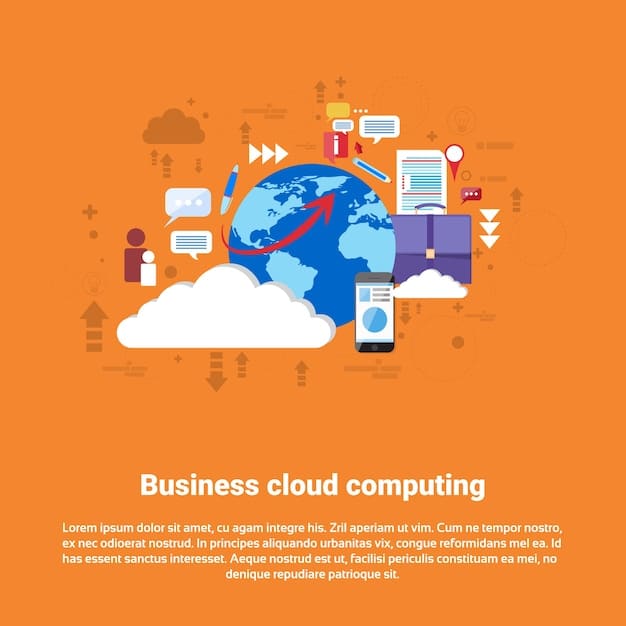US Tech Giants Dominate: AWS, Azure, and Google Cloud Battle for Supremacy

US Tech Giants Compete in the Cloud Computing Market: AWS, Azure, and Google Cloud are the leading providers. Each offers unique services and solutions, driving innovation and intense competition in the rapidly expanding cloud landscape.
The cloud computing market is a high-stakes arena where US Tech Giants Compete in the Cloud Computing Market: AWS, Azure, and Google Cloud are locked in a fierce battle for supremacy. These three titans, Amazon Web Services (AWS), Microsoft Azure, and Google Cloud Platform (GCP), are constantly innovating, expanding their services, and vying for a larger share of the burgeoning cloud market.
Understanding this dynamic competition is crucial for businesses looking to leverage the power of the cloud. Which platform offers the best value? Which is innovating fastest? This article breaks down the key aspects of this ongoing cloud war.
Understanding the US Tech Giants Compete in the Cloud Computing Market
The cloud computing market has transformed the way businesses operate, offering scalable, on-demand access to computing resources. Within this competitive landscape, US Tech Giants Compete in the Cloud Computing Market: AWS, Azure, and Google Cloud hold significant sway, each bringing unique strengths and strategies to the table.

Understanding the nuances of their offerings and competitive positioning is essential for businesses looking to leverage the cloud effectively. Let’s delve into each platform individually.
Amazon Web Services (AWS): The Pioneer
As the first major player in the cloud computing market, AWS has enjoyed a significant head start. Over the years, the platform has established itself as a comprehensive and mature cloud service offering a wide range of services.
- Extensive Service Portfolio: AWS boasts the broadest selection of cloud services, including compute, storage, databases, analytics, machine learning, and more.
- Global Infrastructure: With a massive global infrastructure spanning numerous regions and availability zones, AWS provides unparalleled scalability and reliability.
- Mature Ecosystem: AWS has cultivated a large and active ecosystem of partners, developers, and users.
AWS is the undisputed leader in cloud computing market share and continues to innovate and expand its reach across diverse industries. However other platforms are catching up.
Microsoft Azure: The Enterprise Favorite
Microsoft Azure has emerged as a formidable competitor, leveraging its strong relationships with enterprise customers. With its integration with Microsoft’s existing ecosystem, Azure presents a compelling proposition for businesses already invested in Microsoft technologies.
- Hybrid Cloud Capabilities: Azure excels in hybrid cloud deployments, allowing businesses to seamlessly integrate their on-premises infrastructure with the cloud.
- Windows-Friendly Environment: Microsoft environments can easily deploy and manage Windows-based applications on Azure.
- Strong Enterprise Focus: Azure offers a comprehensive suite of enterprise-grade services, including identity management, security, and compliance solutions.
Azure’s focus on enterprise solutions, coupled with its seamless integration with Microsoft’s existing products, has positioned it as a strong contender in the cloud computing market. They’re constantly making changes to try and gain more market share.
Google Cloud Platform (GCP): The Innovation Hub
Google Cloud Platform distinguishes itself through its focus on innovation, particularly in the areas of data analytics, machine learning, and artificial intelligence. GCP leverages Google’s expertise in these fields to provide cutting-edge cloud solutions.
- Data Analytics Prowess: GCP offers advanced data analytics tools, including BigQuery, Dataflow, and Dataproc, for processing and analyzing large datasets.
- Machine Learning Leadership: GCP is at the forefront of machine learning, with its TensorFlow framework and AI Platform.
- Kubernetes Pioneer: Google developed Kubernetes, the open-source container orchestration platform.
GCP’s pioneering work in data analytics, machine learning, and containerization has solidified its position as a leader in cloud innovation. They’re continually working to expand their cloud computing presence and offerings.
The US Tech Giants Compete in the Cloud Computing Market: AWS, Azure, and Google Cloud are constantly innovating to stay ahead. These differences in expertise contribute to each platform’s unique strengths and market focus.
Key Competitive Factors in the Cloud Computing Market
The battle among US Tech Giants Compete in the Cloud Computing Market: AWS, Azure, and Google Cloud involves several aspects, including pricing, performance, security, and innovation.
Let’s examine these factors in detail to better understand how the platforms stack up against each other.

Pricing Strategies
Pricing is a critical factor for businesses evaluating cloud platforms. These competitors each employ unique pricing models with various discounts and options.
- AWS: Offers a range of pricing options, including pay-as-you-go, reserved instances, and spot instances.
- Azure: Provides pay-as-you-go pricing, reserved instances, and hybrid benefit options for existing Windows Server licenses.
- Google Cloud: Offers sustained use discounts, committed use discounts, and preemptible virtual machines.
Comparing pricing can be complex, as it depends on specific usage patterns and requirements. It’s essential to carefully evaluate each platform’s pricing model.
Performance and Reliability
Performance and reliability are paramount for cloud applications. US Tech Giants Compete in the Cloud Computing Market: AWS, Azure, and Google Cloud invest heavily in infrastructure to ensure high availability and low latency.
Each provider offers service level agreements (SLAs) that guarantee a certain level of uptime and performance. AWS has a proven track record of reliability, while Azure and Google Cloud have made significant strides in recent years to improve their performance and stability.
The US Tech Giants Compete in the Cloud Computing Market: AWS, Azure, and Google Cloud, and each platform offers a variety of tools and services for monitoring and managing performance.
Security and Compliance
Security is a top concern for businesses migrating to the cloud. AWS, Azure, and Google Cloud offer comprehensive security features and compliance certifications to protect customer data.
Each provider adheres to industry standards such as ISO 27001, SOC 2, and PCI DSS. AWS has a robust security framework with services like Identity and Access Management (IAM) and Key Management Service (KMS). Azure has integrated security features and compliance offerings. Google Cloud provides security controls and compliance certifications.
Innovation and New Services
Innovation is a key differentiator in the cloud computing market. US Tech Giants Compete in the Cloud Computing Market: AWS, Azure, and Google Cloud are continuously launching new services and features to attract customers and stay ahead of the competition.
AWS is known for its rapid pace of innovation, frequently introducing new services in areas like serverless computing, edge computing, and artificial intelligence. Azure focuses on integrating with existing Microsoft technologies and pushing advancements in hybrid cloud and IoT. Google Cloud leverages its expertise in data analytics and machine learning to offer innovative solutions.
These factors are vital in the competitive landscape as US Tech Giants Compete in the Cloud Computing Market: AWS, Azure, and Google Cloud platforms attempt to win out.
The Impact of the Cloud Computing Market Competition
The intense competition among US Tech Giants Compete in the Cloud Computing Market: AWS, Azure, and Google Cloud has significant implications for businesses and the broader technology landscape.
This competition delivers wider options to their consumers, more efficient scaling, higher security, and more cost-effective solutions.
Benefits for Businesses
The cloud computing market competition benefits businesses in several ways. It drives down prices, fosters innovation, and increases service availability.
Cloud platforms are constantly improving their offerings, providing businesses with access to cutting-edge technologies and more flexible and scalable solutions. In addition, the rivalry encourages providers to deliver a wide choice of product options.
As US Tech Giants Compete in the Cloud Computing Market: AWS, Azure, and Google Cloud try to win more customers, consumers get more flexible product options, better pricing, and improved services.
Innovation and Technological Advancements
The competition has fueled innovation and technological advancements in cloud computing. As each provider seeks to gain an edge, they aggressively invest in research and development, resulting in new and improved services.
This constant innovation cycle has led to breakthroughs in areas such as machine learning, artificial intelligence, big data analytics, and serverless computing. Businesses can leverage these advancements to drive digital transformation and gain a competitive advantage.
With all the advancements driven by the rivalry between the US Tech Giants Compete in the Cloud Computing Market: AWS, Azure, and Google Cloud businesses can now rely on better and more efficient programs and services.
Economic Growth and Job Creation
The cloud computing market competition stimulates economic growth and job creation. The increased adoption of cloud services leads to greater efficiency, productivity, and innovation, boosting economic output.
The growth of the cloud market also creates new job opportunities in areas such as cloud architecture, cloud security, cloud engineering, and cloud consulting. As businesses migrate to the cloud, they require skilled professionals to design, deploy, and manage cloud-based solutions.
These three US Tech Giants Compete in the Cloud Computing Market: AWS, Azure, and Google Cloud, help to stimulate the creation of jobs and provide avenues for people with different skill sets to find their space in this ever-growing niche.
Strategies for Choosing the Right Cloud Platform
Selecting the right cloud platform requires careful consideration of specific business needs and priorities. US Tech Giants Compete in the Cloud Computing Market: AWS, Azure, and Google Cloud and offer various options.
Here are some strategies for making an informed decision.
Assess Business Requirements
Start by thoroughly assessing your business requirements. Understand your current and future needs in terms of compute, storage, networking, databases, analytics, and other cloud services.
Consider factors such as scalability, performance, security, compliance, and budget. Identify any unique requirements or constraints that may influence your choice.
By evaluating each platform, businesses will be able to find which ones fulfill most or all of their needs. In turn, it will be easier to select from all the US Tech Giants Compete in the Cloud Computing Market: AWS, Azure, and Google Cloud.
Evaluate Pricing Models
Carefully evaluate the pricing models of each cloud platform. Compare the costs of different services and configurations based on your anticipated usage patterns.
Consider factors such as pay-as-you-go pricing, reserved instances, sustained use discounts, and committed use discounts. Determine which pricing model aligns best with your budget and cost optimization goals.
Price evaluations will allow for better budgeting and cost optimization, allowing the allocation of funds to other departments and sectors that need investment.
Consider Integration with Existing Infrastructure
Consider the ease of integration with your existing infrastructure. If you already have significant investments in Microsoft technologies, Azure may be a natural choice.
If you’re heavily invested in data analytics and machine learning, Google Cloud may be a better fit. If you require the most comprehensive service portfolio and a mature ecosystem, AWS may be the preferred option.
Seamless integration will not only help with the transition into a new platform but will make it easier for personnel to use and adapt to the changes, offering smooth adaptation and management.
Conduct Proof-of-Concept Projects
Consider testing each cloud platform with proof-of-concept projects. This will enable you to evaluate the performance, scalability, and usability of each platform in a real-world setting.
Proof-of-concept projects can help you uncover any potential challenges or limitations and validate your assumptions. By conducting these tests, you can make a more informed decision based on empirical data.
With a tested cloud platform, business consumers are sure to have their needs and satisfaction taken care of.
The Future of the Cloud Computing Market
The cloud computing market will continue to evolve with the US Tech Giants Compete in the Cloud Computing Market: AWS, Azure, and Google Cloud . Here are some trends that are expected to shape the future:
These trends can help predict and better understand the cloud computing market and its possible evolutions in the near future.
Edge Computing
Edge computing will become increasingly important, bringing computation and data storage closer to the edge of the network. AWS, Azure, and Google Cloud offer edge computing services that enable businesses to process data locally, reducing latency and improving performance.
The rise of edge computing will drive the adoption of cloud services in industries such as manufacturing, healthcare, and transportation, where low latency and real-time processing are critical.
For the US Tech Giants Compete in the Cloud Computing Market: AWS, Azure, and Google Cloud, this is an excellent opportunity to capture new markets with new services within Edge Computing.
Serverless Computing
Serverless computing will gain further traction, allowing developers to focus on writing code without managing servers. AWS Lambda, Azure Functions, and Google Cloud Functions enable businesses to build and deploy applications without the overhead of server management.
As serverless computing matures, it will drive greater efficiency, scalability, and cost savings, making it a preferred choice for many workloads.
This technology has the potential to reshape the future in several niches. These US Tech Giants Compete in the Cloud Computing Market: AWS, Azure, and Google Cloud will certainly keep pushing advances in the sector.
Artificial Intelligence and Machine Learning
Artificial intelligence (AI) and machine learning (ML) will become even more deeply embedded in cloud services. AWS, Azure, and Google Cloud offer AI and ML platforms that enable businesses to build and deploy intelligent applications.
The integration of AI and ML into cloud services will drive new opportunities for automation, personalization, and innovation across industries.
These tools can have an exponential impact on all niches, improving production, automation, analysis, and other key sectors for businesses.
| Key Point | Brief Description |
|---|---|
| 🚀 Cloud Dominance | US Tech Giants like AWS, Azure, and Google Cloud are leaders in the cloud market. |
| 💰 Pricing Strategies | Each giant offers unique pricing models including pay-as-you-go and reserved instances. |
| 💡 Innovation Drivers | Competition fuels innovation, benefiting business through cost and technological advancement. |
| 🛡️ Security Measures | Each provider invests massively in security to protect users. |
Frequently Asked Questions
These tech giants provide services like computing, storage, databases, networking, and machine learning. These can be used for a wide variety of purposes.
They invest heavily in security with advanced encryption methods, physical security, compliance certifications, and access controls ensuring user data safety.
They offer various pricing options, including pay-as-you-go, reserved instances, and tiered pricing, ensuring flexibility and cost-effectiveness for diverse user needs.
Cloud computing offers scalability, cost-effectiveness, enhanced security, and improved operational efficiency, empowering businesses to innovate and grow in the digital age.
Competition drives innovation, lowers prices, and improves services, offering businesses better options, cost savings, and advanced features to choose from.
Conclusion
The US Tech Giants Compete in the Cloud Computing Market: AWS, Azure, and Google Cloud are competing in a rapidly evolving landscape. The cloud computing market will continue to evolve and will continue to deliver better services and benefits to corporations.
The dynamic competition among these providers ensures ongoing innovation, cost optimization, and enhanced capabilities, providing organizations with powerful tools to achieve their digital transformation goals.





